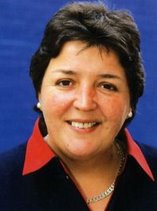
We think that the Dept of Health have known this and have made their feelings clear to politicians who wanted to nobble what they read as opposition to their Top Down roll outs .... At Birmingham And Solihull Mental Health Trust there is a pattern to of too much control over User's Voices but there is some dissent and better thinking being employed - we only hope the future will see more independence but we feel there will be real resistance in the Trust to this .. Pity really the logical step is for User Organisations to grow up and away from the body of the "parent" - how else will independent vision survive in Birmingham ?
Local Government and Public Involvement in Health Bill
Report on Meeting with Meredith Vivian on June 22nd 2007 - Final
Attendance
Department of Health: Meredith Vivian and Clare Allcock
Michael English and Malcolm Alexander
2) Transition
We opened the meeting by making the case for an effective transition from Forum to LINks and emphasized the loss to the NHS and patients of monitoring by Forums, the risks to patient safety and the disaffection of Forum members.
Meredith suggested that it was not a matter of great importance if there was a gap between the closure of Patients’ Forums and the beginning of LINks, as Forums were so variable across and between different areas. He said he was not convinced that the gap is significant or that continuity was essential in the context of the proportionate use of resources, i.e. that the cost of ensuring that there was no gap was disproportionate bearing in mind the damage of a short gap.
We discussed the differences between the impact on communities as a whole and the impact on those more closely involved with Patients’ Forums.
We emphasized the critical importance of valuing Forum members as volunteers who contribute their labour at no cost and who expect to be valued and listened to by the statutory services and the DH. We explained our view that the monitoring of services by PF members and eventually LINks was essential for patient safety. We also emphasized the need to harness the skills and experience of volunteer and the importance of not causing disaffection.
MV said that at the moment there is an absolute gap in terms of social care and said he thought it was important to push ahead as soon as possible to ensure that both health and social care are monitored by LINks.
We did not dissent from this view but emphasized the need for effective continuity between the two systems with every effort taken to support members of PFs to join LINks and to continue the work of PFs into the new system. We said that it was rudely arrogant of the DH not to demonstrate and value the work of volunteers and the community in a more positive way. MV apologised if this was the impression given.
MV said that he recognised the ‘gap’ as an issue for Forum members and the DH had learnt from the 2003 experience when CHCs were closed i.e. that the learning was that ensuring that there was no gap meant that Forums were forced into existence without being given the time needed to grow into their role.
He added that enthusiasm for the new arrangements was essential if they were to work. He felt that the development of LINks needed active encouragement. Clare Allcock added that flexibility was the key issue to the success of LINks and that many local authorities and many other stakeholders were showing enthusiasm for the early development of LINks.
3) Transitional Arrangements
We discussed practical arrangements for the proposed transition. We suggested abolition should be delayed until the new arrangements were functional and that a group of CPPIH staff could be allocated to support PFs and attached to either the DH or the NCI.
MV responded that the cost of paying to remove the gap was too great. We responded that keeping the gap was of no benefit to PFs, LINks or the NHS. We proposed that there should be incentives, provided by the DH to encourage PF members to remain within the PI system.
Clare said that Local Authorities will have a legal duty to establish LINks and that the DH is encouraging LAs to set up LINks and involve Forum members during the development of the contract. They are also encouraging OSCs to work with Forum members to bring them into the new system. She added they were trusting the LAs to get on with the job.
We said that we would work through LAs and the LGA to encourage them to support abolition of PFs at a time that would effect the most beneficial transition.
4) Visits
We emphasized that successful visiting required the development of good local relationships with providers and PCTs, regular contact to understand how organisations worked and the means of communicating effectively with patients/residents and staff.
MV did not dissent from this view but said the DH was bound by cross-government policies which were designed to achieve coordination between the 50 and 60 different bodies that monitored health and social care. He said there was a ‘gate-keeper’ role for Regulators and that the need for coordinated monitoring was a cross-Government policy.
We then suggested that the recommendations of the Bristol Inquiry which called for closer integration of patients and the public with the monitoring of health care at a local level did not appear to have had a major influence on the Bill in relation to LINks. MV reiterated that the approach to coordination with regulators was a cross-Government policy and it would appear that we need to raise this issue with other parts of government and through the political process.
Michael suggested that monitoring under the LINks system would lead to a two tier system of membership in which some members would have visiting rights (including CRB checks and training) and some would not. MV confirmed that this would be the case.
MV said that if LINks members wished to visit they would need to write to the Regulator who would be required to respond within 20 working days. If the LINks received no response within that time the visit could, nevertheless, go ahead. We suggested that in effect a LINks member operating within the legislation may have fewer rights of access than a member of the public who is not a LINks member. We suggested that phoning up the Chief Executive of a Trust and arranging a visit would be the usual practical way of arranging a visit. Clare Allcock pointed out that if this happened, the statutory powers would not be operationalised. It became clear that in areas where LINks were very active that the Regulator could be very actively engaged in the relationship between LINks and the Trust.
5) Monitoring and the right to view
MV acknowledged our criticism of the wording of the legislation and the fact that it is written in a way that looks prescriptive. He said that there is no reason why LINks could not talk to patients and staff whilst visiting for the purpose of viewing. We agreed to prepare detailed arguments on this point.
6) LINks access to primary care and private services
contracted by PCTs and NHS Trusts
MV confirmed that under section 225(7) (e) primary care service providers (including GPs) would be included amongst those organisations which would be required to provide access to LINks members for the purposes of ‘entering and viewing and observing the carrying on activities’.
With respect to private healthcare services contracted by the NHS, access for LINks for the purpose of ‘entering and viewing and observing the carrying on activities’, would be through the contractual route, by which PCTs and NHS Trusts would be directed to allow a LINk to enter and view and observe etc. We do not have a copy of the wording of this ‘direction’ but we will pursue this. [Malcolm, I think you do have the patients forums directions don’t you?]
7) Mental Health and Children’s Services
We clarified that LINks would have access to NHS services for mental health and children except that there would be no automatic rights of access when there is a tenancy agreement or where care is provided in a person’s own home or in residential care. In such cases the consent of the resident would be required.
Note: we need to clarify arrangements where a person is on a Section of the Mental Health Act or where they are not able to give consent.
We said that LINks had no power to enter premises as providers would be under a duty to allow a LINk to enter rather than the LINk itself having the power.
MV said that the arrangement for LINks was the same as currently exists for Patients Forums.
8) The National Centre for Involvement
It was confirmed that the current priorities of the NCI are to build the capacity of NHS organisations and their staff for high quality PPI and to develop and disseminate practical resources to NHS staff that aid PPI.
MV confirmed, however, that the NCI would also have a programme of work to support the development and effective operation of LINks.
9) Public consultation (current Section 11 of the H&SC Act) – Section 232
We argued that Section 232 of the Bill would result in the public having fewer rights to be consulted. MV denied that this was the case and said that by adding the word “significant” to 232(2)(1B)(c) of the Bill that this would have no major impact on the involvement of the public in the planning and provision of services, as the threshold would not be affected. As an example he said that if a GP surgery changed surgery times from 9am to 12 noon, to new hours of 2pm to 5pm, this was not a significant change in services and therefore consultation would not be required.
We argued that the Government had proposed this amendment to Section 11 in response to the successful Appeal in the case of the North Eastern Derbyshire PCT (Cresswell/Langwith Practice), to prevent changes to the management of GPs practices being subject to patient and public consultation. MV replied that his concern was with PPI and that any more general or political consequences of the proposed change to the legislation, would need to be discussed elsewhere. He added that the change in ownership of a GP practice was in his view a minor change and would not need to be subject consultation.
10) Publicity about LINks
MV accepted our invitation to respond to issues raised by the community and Forum members about the development of LINks in publicity put out nationally by the National Association.
At the end of the meeting we offered Meredith the opportunity to present the policy of the DH and respond to issues raised by Forums in a newsletter we planned to produce. He agreed.
End

.jpg)







No comments:
Post a Comment